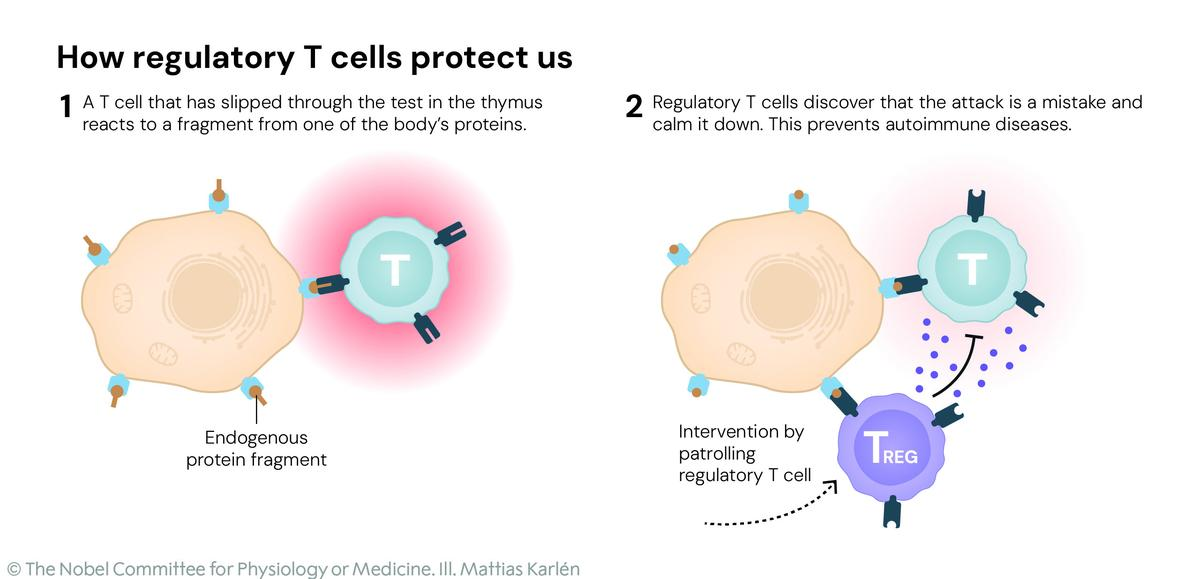Nobel Prize in Physiology or Medicine 2025

- 09 Oct 2025
In News:
The 2025 Nobel Prize in Physiology or Medicine was awarded jointly to Mary Brunkow, Fred Ramsdell, and Shimon Sakaguchi for their pioneering work on peripheral immune tolerance. Their research identified the critical role of regulatory T-cells (Tregs) in preventing the immune system from attacking the body’s own tissues.
The Human Immune System
The immune system protects the body against harmful pathogens, including bacteria, viruses, fungi, and parasites. It is composed of:
- Organs: Bone marrow, thymus, spleen, lymph nodes, and tonsils.
- Cells: White blood cells (leukocytes), including lymphocytes, macrophages, and neutrophils.
- Molecules: Antibodies, cytokines, and complement proteins.
Its central challenge is distinguishing between harmful invaders and the body’s own healthy cells, including those altered by mutation or cancer.
B-Cells and T-Cells
Lymphocytes, including B-cells and T-cells, are key players in immune defense.
- B-cells: Produce antibodies to neutralize antigens. Main types include plasma cells and memory cells.
- T-cells: Originate in the bone marrow, mature in the thymus, and migrate to lymphoid tissues and the bloodstream. Types include:
- Cytotoxic T-cells: Destroy virus-infected and tumor cells.
- Helper T-cells: Coordinate immune responses by signaling other immune cells.
- Regulatory T-cells (Tregs): Suppress excessive immune activity, preventing autoimmune reactions and maintaining self-tolerance.
Discovery and Significance
The laureates’ research revealed regulatory T-cells as the immune system’s “security guards,” preventing it from attacking the body.
Key implications:
- Advanced understanding of peripheral tolerance, the mechanism by which the immune system avoids self-damage.
- Informed the development of therapies for autoimmune diseases, cancer, transplantation, and chronic inflammatory conditions.
- Highlighted that tumors may recruit Tregs to evade immune destruction, providing insights for cancer immunotherapy.
The discovery reshaped immunology by showing that the immune system is not solely attack-oriented, but also self-regulating.
About the Nobel Prize
- Established: 1901, through Alfred Nobel’s will (largest share of his fortune dedicated).
- Fields: Physics, Chemistry, Physiology or Medicine, Literature, Peace; Economics added in 1968.
- Awarding Institutions:
- Karolinska Institute: Physiology or Medicine
- Royal Swedish Academy of Sciences: Physics, Chemistry, Economics
- Swedish Academy: Literature
- Norwegian Nobel Committee: Peace Prize
- Award Venues: Stockholm (all except Peace), Oslo (Peace Prize)
- Administration: Managed by the Nobel Foundation, independent of prize selection.
Selection Process:
- Nominations are invited from qualified individuals (scientists, professors, former laureates).
- Expert committees evaluate candidates and recommend winners.
- Final decisions rest with the respective Nobel institutions.
